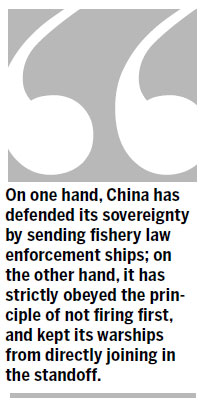Never compromise principles
Updated: 2012-05-07 08:06
By Yang Yi (China Daily)
|
||||||||

China stands firm on sovereignty issues but seeks peaceful solutions to settle disputes with neighboring countries
The recent crisis around Huangyan Island, where ships from China and the Philippines are in a standoff, is only one of the challenges the Philippines has made to China in the South China Sea.
Actually the Philippines has previously arrested Chinese fishermen in the disputed waters on several occasions, but this time it has adopted a tough attitude and refused to release them even after diplomatic negotiations.
On the contrary, after China's fishery law enforcement ships arrived on the scene, the Philippines raised the tension by sending warships.
By raising the stakes in this way, the Philippines, emboldened by having recently strengthened its security cooperation with the United States, wants to force China into a corner and turn its territorial claims into reality.
If the incident escalates into open military conflict, it wants its most powerful ally, the United States, to back it against China. Even if it does not, the Philippines is hoping to gain the support of the international community by portraying itself as a small, bullied country being threatened by China.
Without doubt, if the Philippines gets support from the US and other countries it will take an even tougher approach in the future.
The Philippines has a very good plan, with only one drawback: neither the US nor any of its other allies are its puppets. Actually, the alliance between the US and the Philippines is typical of an alliance between a big power and a small country, in which the big power fears being dragged into a conflict not of its choosing, while the small country fears being sacrificed in the interests of its powerful ally.
The US wants to make use of China's disputes with its neighbors to contain and balance China, but it does not want to become involved in any direct military conflict with China. Its recent promise of not "taking sides" bears testimony to this policy.
The lack of US support puts the Philippines in an embarrassing position, if it provokes a military conflict, it will have to face the consequences alone without any strong support; if it backs down it will humiliate itself. So, instead of China, the Philippines has successfully driven itself into a corner. Now all it can do is to wait for the US and other allies to ease the tension.
Throughout the crisis, China has adopted a wise policy. On one hand, it has defended its sovereignty by sending fishery law enforcement ships; on the other hand, it has strictly obeyed the principle of not firing first, and kept its warships from directly joining in the standoff.
In the future, I think China can continue its current policy, which is both tough and reasonable. And I advise it to follow the four principles outlined below in order to reach a solution to the problem:
First, be tough with any matter concerning its sovereignty over the islands.
Second, communicate with world media outlets, so that more countries know China is defending its own territory.
Third, maintain effective communication with the international community and let the world know its bottom line.
Fourth, advocate solving the matter through peaceful means and call for all sides to obey the Declaration of Conduct of Parties in the South China Sea, which should be the basic code of conduct for resolving the disputes.
For China, the Huangyan Island crisis is both a challenge and an opportunity. Hopefully it will be ended in a satisfactory way so as to offer an example for all other disputes to follow.
The author is a rear admiral and former director of the Institute for Strategic Studies at the People's Liberation Army National Defense University. This is an excerpt of his interview with China Daily's Zhang Zhouxiang.

 Relief reaches isolated village
Relief reaches isolated village
 Rainfall poses new threats to quake-hit region
Rainfall poses new threats to quake-hit region
 Funerals begin for Boston bombing victims
Funerals begin for Boston bombing victims
 Quake takeaway from China's Air Force
Quake takeaway from China's Air Force
 Obama celebrates young inventors at science fair
Obama celebrates young inventors at science fair
 Earth Day marked around the world
Earth Day marked around the world
 Volunteer team helping students find sense of normalcy
Volunteer team helping students find sense of normalcy
 Ethnic groups quick to join rescue efforts
Ethnic groups quick to join rescue efforts
Most Viewed
Editor's Picks

|

|

|

|

|

|
Today's Top News
Health new priority for quake zone
Xi meets US top military officer
Japan's boats driven out of Diaoyu
China mulls online shopping legislation
Bird flu death toll rises to 22
Putin appoints new ambassador to China
Japanese ships blocked from Diaoyu Islands
Inspired by Guan, more Chinese pick up golf
US Weekly

|

|






